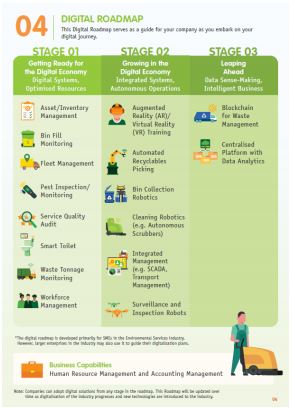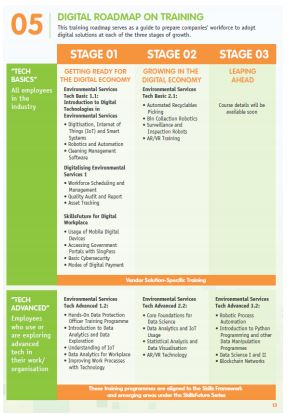Singapore continues to fortify the digitisation across various sectors, as the National Environment Agency (NEA) and the Infocomm Media Development Authority (IMDA) recently jointly refreshed the Environmental Services Industry Digital Plan (ES IDP).
This latest move follows closely on the heels of the new IDP that charts the digital roadmap for food manufacturers in the city.
The ES IDP, however, has been in place since 2018 – forming part of IMDA’s SMEs Go Digital programme that aims to make going digital simple for SMEs. It includes a three-stage digital roadmap, which charts out the digital solutions that SMEs can adopt at each stage of their growth. Larger enterprises can also use the digital Roadmap to guide their digital journey
Pandemic exacerbates manpower shortage amid demand surge
The ongoing COVID-19 pandemic has greatly increased the demand for and expectations of environmental services. With manpower challenges across the cleaning, waste management and pest management sub-sectors, Transforming the industry to be more productive is therefore critical to ensure continued delivery of environmental services to provide a clean, liveable and sustainable environment in Singapore.
“The COVID-19 situation has underscored the critical role of the Environmental Services industry in safeguarding public health, and provided an impetus for companies to improve their operations to become more efficient and productive as they experience an increase in demand for their services while facing manpower constraints,” said Dr Amy Khor, senior minister of state for sustainability and the environment.
She pointed out that adoption of technologies and digital solutions such as cleaning robots and smart toilet systems has not only led to higher productivity, but also enabled companies to upskill their workforce and enhance jobs.
“The refreshed ES IDP, which now includes the pest management sub-sector, is yet another milestone in our efforts to transform the Industry. We encourage companies to tap into the refreshed plan build a future-ready workforce,” she said.
Pest management subsector added to expanded scope
The IDP now covers the pest management sub-sector as well, in addition to cleaning and waste management. New digital solutions for the environmental services (ES) industry have also been added. These enable the whole industry to look forward to a more employable workforce, such as preparing multi-skilled professionals who can move across various sub-sectors. Businesses can also synergise cleaning, waste management and pest management services to reap greater efficiency and productivity.
Furthermore, the refreshed ES IDP have incorporated into its list newer and more advanced technologies such as robotics, augmented and virtual reality as well as blockchain, as their commercial applications are now more mature and readily accessible.
 Some of these solutions are now relevant even for SMEs at an earlier stage of their growth. SMEs can tap on the Productivity Solutions Grant (PSG) for the ES industry to adopt pre-approved digital solutions recommended in the ES IDP.
Some of these solutions are now relevant even for SMEs at an earlier stage of their growth. SMEs can tap on the Productivity Solutions Grant (PSG) for the ES industry to adopt pre-approved digital solutions recommended in the ES IDP.
Using the PSG, eligible companies can be supported with up to 80% of the qualifying cost, capped at S$350,000, until September 30, 2021. Latest statistics shows 1,500 PSG applications have approved for 518 companies, with about S$36 million of the PSG being committed as of early April.
Continuous upskilling of ES workforce
Since 2019, the NEA has worked with partners to develop short courses for members of the ES workforce to learn more about the use of digital technology in environmental services.
For one, the “Introduction to Digital Technology in Environment Services” course offered by the Institute of Technical Education (ITE) includes robotics and automation, as well as software and management systems[. Ngee Ann Polytechnic also offers a course on Digitalising Environmental Services. To date, about 200 people have attended both courses.
To ensure that the ES workforce is adequately equipped with the necessary skills and knowledge to adopt digital solutions, companies can refer to the Digital Roadmap on Training in the ES IDP, which includes the type of courses available to equip their employees with the relevant skills and knowledge.
 Meanwhile, the Digital Roadmap on Training will also be continuously updated to ensure that the industry’s workforce is adequately prepared with the necessary skills and knowledge to adopt digital solutions, so that they are ready for changes that come with digital transformation
Meanwhile, the Digital Roadmap on Training will also be continuously updated to ensure that the industry’s workforce is adequately prepared with the necessary skills and knowledge to adopt digital solutions, so that they are ready for changes that come with digital transformation
The IDP will be updated over time as the industry progresses and new, more relevant technologies are introduced. NEA will continue to work with partner agencies to champion initiatives to attract and retain local talent, upskill the workforce and accelerate technology adoption. Together with the support of the trade associations, we can build stronger businesses and enhance jobs in the ES industry.



